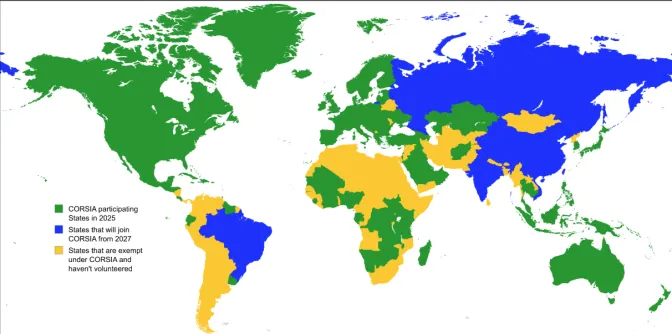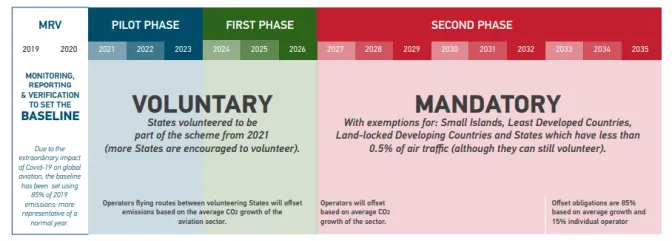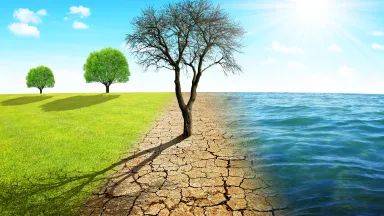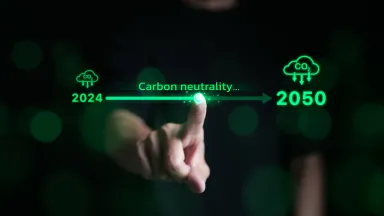2 min. read
·3 August, 2025
·3 min. read
CORSIA: international aviation imposes rules on itself to reduce carbon emissions

In November 2024, COP 29 approved Article 6 of the Paris Climate Agreement. With this decision, participants at the UN Climate Change Conference designated climate projects as a crucial means of achieving climate goals. In July 2025, the European Commission confirmed with the new Climate Law that carbon credits from climate projects are necessary to limit the rise in temperature.
Carbon Offsetting and Reduction Scheme for International Aviation (CORSIA)
International aviation decided back in 2016 to use carbon removal to tackle carbon emissions in the sector. In that year, the International Civil Aviation Organization (ICAO) adopted the Carbon Offsetting and Reduction Scheme for International Aviation (CORSIA). In 2021, the compensation requirements came into force for a three-year pilot phase. In 2024, the first phase of CORSIA began, with 126 participating states. A year later, three more states joined, bringing the total to 129.

Carbon removal as a supplement to carbon reduction
The aviation industry is using carbon removal as one of the ways to achieve net-zero emissions by 2050. CORSIA is a necessary measure for the sector, but it is not the only one. In addition to investing in carbon credits and thereby enabling climate projects, the aviation industry is committed to reducing emissions. To reduce carbon emissions, the sector is working on technological advances, improving processes and infrastructure, and replacing fossil aircraft fuel with sustainable fuels (Sustainable Aviation Fuel, SAF).
CORSIA integrity rules
The ICAO monitors the environmental integrity of CORSIA. The criteria used by ICAO are based on the principles of carbon trading and on the certification standards for carbon offsetting:
• The reduction or removal of greenhouse gases is additional to normal business activities.
• Offsets represent a permanent reduction in emissions.
• An activity that generates offsets does not lead to an increase in emissions elsewhere.
• A reference point is established that reflects what would have happened if the project had not been implemented. Emission reductions are quantified through measurements, protocols, and audits.
• Projects have procedures in place to monitor progress and prevent emission reductions from being counted more than once.
• Projects must prevent environmental and social risks.
• Projects must demonstrate that the country in which the project is located does not (also) count the offsetting achieved by the project towards its national targets.
Reporting requirements under CORSIA
All airlines with annual emissions exceeding 10,000 tons of CO2 are required to report emissions from their international flights. Airlines must track the fuel consumption of each flight in order to calculate their carbon emissions.
First voluntary phase, then mandatory
CORSIA has a voluntary phase and a mandatory phase. In each phase, participants must demonstrate that they have met their compensation requirements.
• From 2021 to 2026 (pilot phase from 2021 to 2023 and first phase from 2024 to 2026), only flights between states voluntarily participating in CORSIA must meet compensation requirements.
• From 2027 onwards, all international flights must comply with compensation requirements. Flights to and from least developed countries, small island states, landlocked developing countries, and states with less than 0.5% aviation activity are exempt, but may participate voluntarily.
See also the image from ATAG below:

The market for carbon credits
Climate legislation as determined at COP 29, the European Climate Law, and the establishment of CORSIA by and for the aviation industry are leading to increasing recognition of the importance of climate projects and carbon credits. The market for carbon credits is expected to grow. This will support current climate projects and enable new ones.
Ecommit is also committed to increasing the number of climate projects. We are making significant investments in climate projects to support their development and to enable every company to contribute to climate projects.
Would you like to know more about CORSIA or ecommit's services? Please contact us.
Questions about addressing carbon emissions?
Do you have a question or do you want more information? Contact us for a free consultation.




